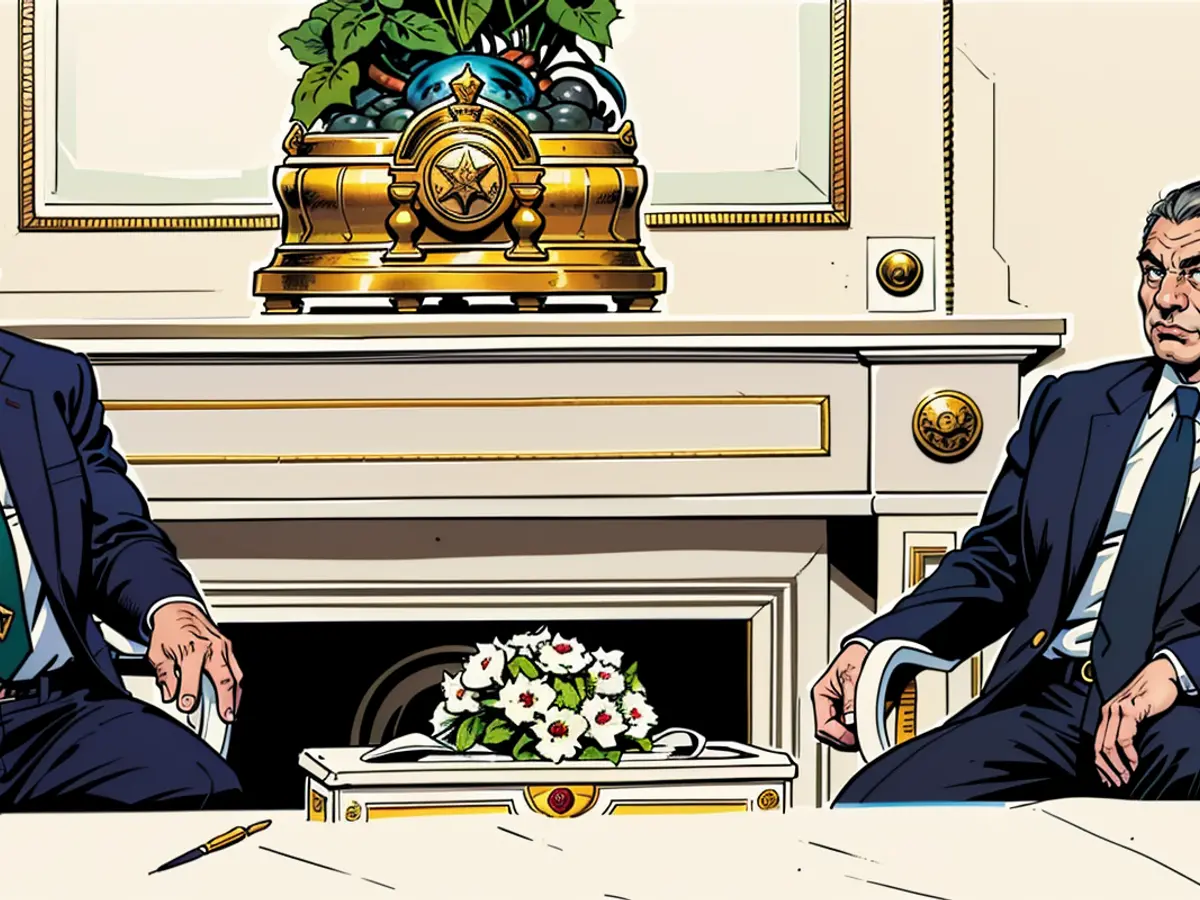Explosive journey - Orban provokes EU partners with trip to Putin
Hungarian Prime Minister Viktor Orban's unsanctioned visit to Russian President Vladimir Putin has caused outrage from EU and NATO partners. Leading politicians criticized the trip as "irresponsible" and harmful for efforts to achieve a peace acceptable to Ukraine, especially since Hungary only took over the rotating EU Council presidency on the previous Monday.
EU Commission President Ursula von der Leyen made her stance clear, viewing Orban's solo actions as a threat to the European Union's credibility. "Only unity and determination will pave the way to a comprehensive, fair, and lasting peace in Ukraine," she commented. "Appeasement politics will not deter Putin."
NATO Secretary-General Jens Stoltenberg and German Chancellor Olaf Scholz reacted more cautiously. Scholz clarified that Orban traveled to Putin as Hungary's prime minister and not as the EU's foreign representative.
Stoltenberg stated in Brussels that Hungary informed the alliance about the trip in advance. He emphasized that it was essential for all to agree that Russia is the aggressor in the conflict with Ukraine, and respect for territorial integrity and sovereignty should be upheld. Orban does not represent NATO in meetings with Putin. It was also clear that only Ukraine could decide what conditions would be acceptable for peace negotiations.
Putin capitalizes on the situation
Putin took advantage of the situation immediately on Friday. He welcomed Orban with the words: "I understand that this time you are not only coming here as our long-term partner, but also as the current EU Council President of Hungary."
A photo Orban shared on the X platform even featured the EU Council Presidency of Hungary's logo. However, he made no direct comment on it. Instead, he praised his intended role as a mediator in the Ukraine conflict in Moscow. "Slowly, the number of countries that can talk to both warring parties is dwindling, and Hungary is the only country in Europe that can speak with everyone," he said.
Beforehand, he had defined his intended peace mission on the X platform. "Even though the rotating EU Council presidency does not have a mandate to negotiate on behalf of the EU, we cannot refuse and wait for the war to magically end," he wrote. "We will be an essential tool in making the first steps towards peace." Polish Prime Minister Donald Tusk commented on this: "The question is, in whose hands this tool lies."
Orban's visit benefits Putin
Putin stands to gain significantly from Orban's visit, as it allows him to demonstrate that he is not isolated despite his aggression against Ukraine.
At the same time, the visit offers Putin an opportunity to showcase the discord within the West. The Kremlin leader made it clear that he would hardly deviate from his plans for Ukraine's partition. He had recently laid out his proposals for peace in a speech at his own Foreign Ministry, and Orban was well aware of them, he said, nodding approvingly at his guest.
Putin set as a condition for peace talks the withdrawal of Kiev troops from all four regions in the east and southeast of Ukraine claimed by Moscow. Later, he also rejected the possibility of a ceasefire before the start of negotiations.
Kiev is outraged
The Ukrainian Foreign Ministry criticized Orban's trip to Moscow. "We remind that the principle 'no agreements about Ukraine without Ukraine' is inviolable for our country and call on all states to strictly adhere to it," the ministry in Kiev wrote. The trip took place without Kiev's approval and was not coordinated with the Ukrainian side.
Orban visited Kiev for the first time since the beginning of the war on Tuesday - Orban's first visit since the war began. There, he urged Selenskyj to consider a ceasefire to enable negotiations. Relations between Kiev and Budapest are tense, as Orban has repeatedly delayed aid for Ukraine and sought to prevent sanctions against Russia. Selenskyj publicly left Orban's proposal unanswered. Kiev has officially rejected a weapons truce before the withdrawal of Russian troops.
Orban's surprise visit to Putin was able to surprise no one. The Hungarian has long advocated the position that the political course of the EU and NATO could lead to an expansion of the war beyond Ukraine. Recently, he acted in the NATO to ensure that Hungary would neither financially nor with personnel participate in a planned NATO mission to coordinate weapons deliveries for Ukraine.
Tweet Kristersson, English Tweet Scholz, English Tweet Orban, English Tweet Tusk, English
- The EU Council of Ministers expressed concern over Hungarian Prime Minister Viktor Orban's visit to Russian President Vladimir Putin, viewing it as detrimental to the peace process in Ukraine.
- German Chancellor Olaf Scholz defended Orban, stating that his trip was as Hungary's prime minister, not as the EU's foreign representative.
- Jens Stoltenberg, NATO Secretary-General, acknowledged Hungary's advance notice of the visit but emphasized unity in labeling Russia as the conflict's aggressor.
- Putin welcomed Orban in Moscow, praising him as a "long-term partner" and the current EU Council Presidency of Hungary.
- Orban used his visit to position Hungary as a potential mediator in the Ukraine conflict, despite lacking an EU mandate for negotiations.
- Moscow benefited from Orban's visit, demonstrating that Russia is not isolated and showcasing Western discord over Ukraine.
- Putin reiterated his long-standing demands for a withdrawal of Ukrainian troops from regions claimed by Moscow, while rejecting a ceasefire before negotiations.
- The Ukrainian Foreign Ministry criticized Orban's unauthorized visit and unwavering stance on the inviolable 'no agreements about Ukraine without Ukraine' principle.
- Orban visited Kiev for the first time since the war began, urging Ukrainian President Zelenskyj to consider a ceasefire, but received no response from Kiev.
- Putin's agenda for Ukraine was clear, with his vision for peace talks dismissing any potential for a weapons truce before troop withdrawal, aligning with Orban's position.
- Viktor Orban's surprising visit to Putin further strained international relationships, raising concerns among EU partners and other NATO allies.








